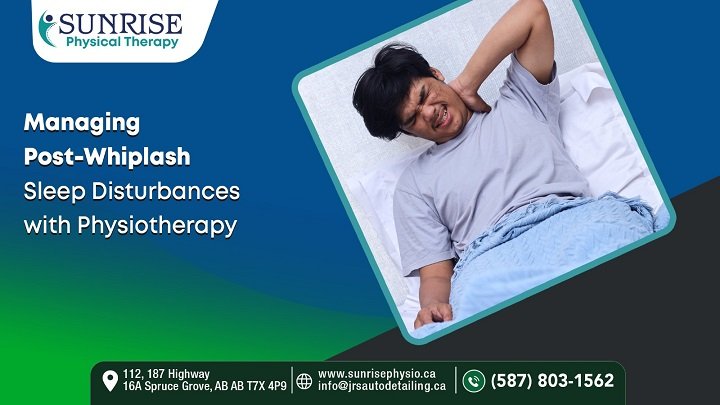Whiplash is typically caused by sudden acceleration-deceleration forces during car accidents, often due to sleep disturbances. These sleep issues can significantly affect a person’s quality of life, making it essential to address them as part of a comprehensive recovery plan. Motor vehicle accident physiotherapy Spruce Grove offers tailored strategies to manage post-whiplash sleep disturbances, aiding patients in finding relief and improving their overall.
Causes of Sleep Disturbances After Whiplash
Sleep disturbances following whiplash during a motor vehicle accident (MVA) have a combination of factors:
– Neck Pain: Persistent neck pain from muscle strain and ligament sprains can make it challenging to find a comfortable position and disrupt sleep.
– Headaches: Tension or cervicogenic headaches (originating from neck problems) are common after whiplash and can interfere with sleep.
– Muscle Tension: Increased muscle tension in the neck, shoulders, and upper back can cause discomfort and restlessness during sleep.
Symptoms of Post-Whiplash Sleep Disturbances
Patients experiencing sleep disturbances after whiplash may report symptoms, including difficulty falling asleep due to pain or discomfort, frequent awakenings during the night often caused by pain or restlessness, and non-restorative sleep, leaving them feeling unrefreshed despite adequate time in bed. Additionally, they may wake up with morning stiffness or pain in the neck and shoulders, which can make it challenging to start the day and experience daytime fatigue or excessive sleepiness due to poor sleep quality.
How Physiotherapy Can Help Manage Post-Whiplash Sleep Disturbances
Motor vehicle accident physiotherapy in Spruce Grove is crucial in addressing the underlying causes of sleep disturbances after whiplash. Below are essential physiotherapy techniques used to manage post-whiplash sleep disturbances:
Pain Management
These are effective methods for managing post-whiplash sleep disturbances. They can also help prepare the body for sleep.
- Heat Therapy for Whiplash: Applying heat to the neck and shoulders is an effective way to increase blood flow, relax tight muscles, and alleviate pain associated with whiplash. For instance, a physiotherapist might recommend the patient use a warm compress on the neck for 15-20 minutes before bedtime to promote relaxation. This therapy can be applied as needed, especially in the evening, to ease discomfort and help the patient prepare for a restful sleep.
- Cold Therapy for Whiplash: Cold therapy reduces inflammation and numbs the affected area, relieving acute pain related to whiplash. For example, the patient can try applying an ice pack to the neck for at least 10-15 minutes, mainly if swelling or intense pain occurs. Cold therapy is most commonly used in the early stages of whiplash or after activities that trigger or worsen pain, helping to manage symptoms effectively.
Manual Therapy
Manual therapy is highly effective in alleviating discomfort and promoting relaxation before bedtime, especially for patients experiencing post-whiplash sleep disturbances as part of car accident physiotherapy.
- Cervical Spine Mobilization: Gentle cervical spine mobilization can benefit individuals experiencing sleep disturbances due to whiplash. This technique aims to reduce stiffness, enhance range of motion, and alleviate neck pain, which may contribute to sleep issues. During physiotherapy sessions, the therapist applies specific hand movements to gently glide and stretch the neck joints, helping to relieve tension and improve overall neck function, potentially leading to better sleep quality.
- Soft Tissue Massage: Soft tissue massage is another practical approach for managing sleep disturbances associated with whiplash. It targets muscle tightness and trigger points in the neck, shoulders, and upper back. The physiotherapist uses techniques like kneading, rolling, and stretching to ease muscle discomfort, which can be integrated into each session to address the specific areas contributing to disrupted sleep.
Therapeutic Exercises
Therapeutic exercises strengthen the neck muscles, improve posture, and enhance overall flexibility. Creating a more stable and relaxed musculoskeletal system helps reduce pain and promote better sleep.
Postural Training and Stretching for Whiplash Recovery
- Postural training is crucial in correcting poor posture, which can exacerbate neck pain and interfere with sleep after a whiplash injury. A typical exercise is the chin tuck, in which the patient stands against a wall, focusing on proper head, neck, and shoulder alignment. Try to practice this exercise regularly throughout the day.
- Stretching exercises help to reduce muscle tightness in the neck and shoulders. For instance, a patient might perform gentle neck stretches by tilting the head to each side and holding the stretch for 15-30 seconds. These stretches are especially beneficial daily, particularly before bedtime, to ease tension and promote better sleep.
Sleep Hygiene Education
Physiotherapists also provide education on proper sleep hygiene practices, essential for managing sleep disturbances following whiplash as part of motor MVA physiotherapy. By implementing a healthy sleep routine, patients can enhance their sleep quality and mitigate the effects of post-whiplash symptoms.
- Creating a Sleep-Conducive Environment: Patients must create an environment that promotes restful sleep. It includes maintaining a calm, dark, and quiet bedroom. For example, a physiotherapist might suggest using blackout curtains, white noise machines, or investing in a comfortable mattress and pillow to enhance the sleeping experience. Consistently maintaining these sleep hygiene practices is crucial for supporting long-term improvements in sleep.
- Establishing a Relaxing Pre-Sleep Routine: A calming pre-sleep routine is essential for signalling the body to wind down and prepare for rest. Patients are encouraged to engage in soothing activities, such as practicing relaxation exercises an hour before bed. This nightly routine helps establish a regular sleep pattern, promoting better sleep.
Restore Sleep and Reclaim The Life with Physiotherapy
Restoring restful sleep after an injury like whiplash is essential for reclaiming one’s quality of life. At Sunrise Physical Therapy Clinic, targeted physiotherapy techniques alleviate pain, improve sleep quality, and restore balance for daily activities. Motor vehicle accident physiotherapy in Spruce Grove offers comprehensive support to patients to overcome sleep disturbances. To harness the healing benefits of physiotherapy, reach out to Sunrise Physiotherapy Clinic and take the first step toward improved sleep and a more vibrant life.
Read More: Physiotherapy


